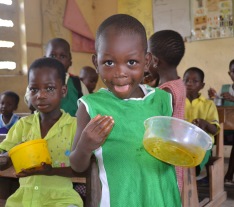 News
News  Ghana Launches National School Feeding Policy
Ghana Launches National School Feeding Policy
 The Government of Ghana has launched its national School Feeding Policy as part of its efforts to eradicate extreme poverty and hunger and achieve universal primary education.
The Government of Ghana has launched its national School Feeding Policy as part of its efforts to eradicate extreme poverty and hunger and achieve universal primary education.
The policy provides broad guidelines, strategies and institutional framework for the operationalisation of government policy towards reducing poverty through improved household income and effective local economic development.
The goal of the policy is to deliver a well-organised, decentralised intervention providing disadvantaged school children with nationally adequate, locally produced food thereby reducing poverty through improved household incomes and effective local economic development.
Mr Akwasi Oppong-Fosu, the Minister of State at the Presidency, said the policy envisioned rapid national socio-economic development through a co-ordinated, integrated and accountable national school feeding programme delivering improved nutrition for disadvantaged school children.
He said the policy objectives included the provision of sustainable social development support to children in deprived Ghanaian communities, strengthened collaboration and coordination between national and sub-national; and fostering local economic development in food production.
“The policy provides a crosscutting interventions related to gender-sensitivity and social inclusivity, social accountability, environmental management and sustainability and image building and information management for school feeding,” he said.
Mr Oppong-Fosu said the Ghana School Feeding Programme (GSFP) was initiated in 2005 as social protection intervention on the context of the Comprehensive African Agricultural Development Programme (CAADP) Pillar III.
He noted that the School Feeding Programme provides an opportunity to pursue the country’s commitment to the Sustainable Development Goals 1 and 2, which seek to end poverty in all its forms and to end hunger, achieve food security and improved nutrition while promoting sustaining agriculture.
Nana Oye Lithur, the Minister of Gender, Children and Social Protection, said the school feeding programme covered about 5,285 public basic schools in 216 districts with total enrolment of over 1,728,681 pupils in the country.
She said since August 2015, an estimated GH¢450 million had been released to the programme to pay all outstanding feeding arrears to caterers.
She said the programme had 1.7 million beneficiary children that represented 36.6 per cent of national coverage.
Technical assistance for the development of the national school feeding policy was provided by Imperial College London's Partnership for Child Development (PCD) and the World Food Programme who worked in partnership with the Ghana School Feeding Programme.
Speaking at the launch, Mrs. Getrude Ananse-Baiden PCD's Country Manager said, "PCD are delighted to be able to continue our work supporting the Ghanaian Government to strengthen and expand its national school feeding programme. This national policy represents a significant step forward in the country’s efforts of a providing a truly national school feeding programme which improves the lives of both children and smallholder farmers."
Nana Oye Lithur, thanked PCD and other partners for the financial and technical support by saying, “The Ministry anticipates the continued interest and support of all these partners as it pursues the vision of a well-organized, accountable decentralized intervention providing disadvantaged school children with nutritionally adequate, locally produced food thereby reducing poverty, improving household incomes and achieving effective local economic development. This way, there will be wins for human development, agricultural productivity, social justice and sustainable national development.”
Source: GNA and PCD



